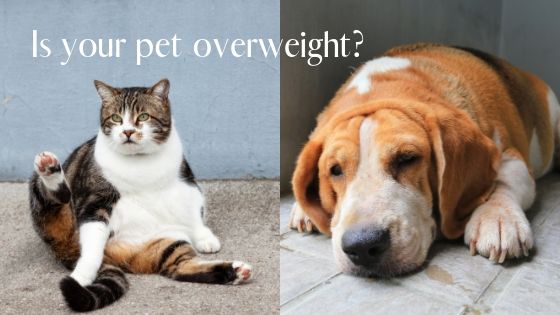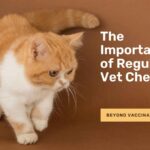Has your dog’s energy level decreased or does your cat sometimes have trouble jumping up on things?
Could it be that your precious pet is one of the 60% of cats or 56% of dogs that are overweight, even obese?
It’s not always easy to recognize changes in your pet’s weight since you see them daily, but it is up to you to help them maintain a healthy lifestyle and to understand how excess pounds can affect their health and quality of life.
5 reasons for weight gain/obesity in pets:
- Overfeeding – allowing easy access to food 24 hours/day, giving high calorie treats/table scraps, sneaking food under the table.
- Hormonal conditions or diseases – Hypothyroidism which causes the metabolism to slow down; Cushing’s Disease where the endocrine glands produce too much cortisol.
- Slower metabolism due to age.
- Not getting enough exercise.
- Wrong kind of food depending on the pet’s stage of life or activity level.
Potential effects of weight gain:
- Worsens arthritis/osteoarthritis
- Insulin-dependent diabetes
- Joint injuries
- Breathing difficulties
- Increased risks of liver and kidney diseases, high blood pressure, heart failure, certain kinds of cancer, shortened life span.
What you can do:
- Implement a weight-loss plan – this could include prescription food, closely reading pet food labels, scheduling meals, adjusting serving sizes, limiting and choosing treats that have a low sugar/fat content.
- Make sure your pet is getting enough nutrients for the breed and level of activity.
- Incorporate regular exercise – now is a great time to start a walking routine with your dog or play fetch with a ball or frisbee. As for cats, there are lots of motion toys, balls, feathers, laser pens you can use to keep them active. Or get your young cat accustomed to wearing a harness and take them for a walk on a leash! Not only does your pet benefit, but so will you!
- Talk to your vet about a healthy diet and weight during your pet’s first visit. Also, if you need advice on helping your dog or cat lose weight, discuss how to best approach the challenge. After all, not all pets will or can follow the same feeding and exercise plan depending on breed, age, weight, and overall health.
Studies have shown that only about half of the cats and dogs placed on a weight-loss program achieve a target weight while others rebound. However, even a modest weight loss can be beneficial and delay ailments and diseases.
Our vets can help!
Dr. Jim Miller and the pet healthcare team at My Hometown Vet will assess your pet’s health, determine if your pet is overweight and if so, offer advice on what steps you can take to achieve a healthy goal for your precious pooch or kitty.
Contact Dr. Jim and his staff at either Durham Animal Hospital 919-620-7387 or North Churton Animal Hospital 919-644-7387 to schedule an appointment for a wellness visit or if you recognize any weight-related issues in your pet. Check out our special offers here.






